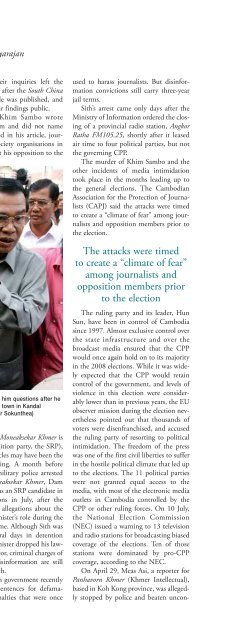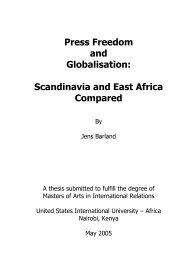FOcus On - International Press Institute
FOcus On - International Press Institute
FOcus On - International Press Institute
You also want an ePaper? Increase the reach of your titles
YUMPU automatically turns print PDFs into web optimized ePapers that Google loves.
sion by going to Thailand illegally, as he<br />
wasted three years there instead of working<br />
and improving his living conditions in<br />
Laos. He says he is lucky that he still has<br />
his farmland and house in Laos.” The<br />
report further quotes the individual as<br />
stating that he is “hap py” to be back in his<br />
“home country”, and that he decided to<br />
return “after re ceiving information that<br />
returning Hmong migrants were welcom -<br />
ed in Laos.”<br />
Amnesty <strong>International</strong>, meanwhile,<br />
points out that international observers<br />
and NGOs have no access to repatriated<br />
Hmong, and that the whereabouts of<br />
most are not known.<br />
Recommendations<br />
Enact a law allowing the establishment<br />
of private media organizations.<br />
Increase access for foreign journalists.<br />
Decriminalize defamation and libel.<br />
Malaysia by Naomi Hunt<br />
Malaysian media, to quote one dissident<br />
journalist, face laws and res -<br />
trictions that “stifle fundamental liberties.”<br />
National security laws have been<br />
used to detain independent journalists as<br />
well as political opponents. The most<br />
notorious is the Internal Security Act<br />
(ISA) of 1960, which allows that the<br />
home minister order the detention of any<br />
person who is suspected of behaving in a<br />
prejudicial manner toward national<br />
security, the provision of services or<br />
economic life in Malaysia. Furthermore,<br />
arbitrary rules on the issuance of publishing<br />
licences en courage self-censorship.<br />
In April, for example, the Tamil-language<br />
newspaper Makkal Osai (The<br />
People’s Voice) received a letter from the<br />
Home Affairs ministry stating that its<br />
application for a new permit had been<br />
denied. Makkal Osai was known for its<br />
criticism of the Malaysian Indian Con -<br />
gress (MIC), a member of the National<br />
Front coalition that rules the country.<br />
Political use of the publishing leads to<br />
self-censorship. Both the Makkal Osai<br />
and a Mandarin-language newspaper, the<br />
Oriental Daily, toned down critical re -<br />
porting while waiting for permits to be<br />
renewed in the run-up to the March elections.<br />
The Oriental Daily even refrained<br />
from running front-page stories about<br />
the opposition.<br />
In the week of 5 September, three<br />
newspapers were threatened with suspension<br />
for reporting that a leading political<br />
Malaysia in brief<br />
figure called Malaysia’s ethnically Chi -<br />
nese community “squatters.” Sin Chew<br />
Daily reporter Tan Hoon Cheng was ar -<br />
rested a week later under the ISA, and<br />
held for questioning for 16 hours.<br />
Bloggers, meanwhile, are frequent targets<br />
of harassment. <strong>On</strong> 7 August, for in -<br />
stance, Abdul Rashid Abu Baker, who<br />
runs the blog “penarik beca” (trishaw<br />
ped dler), was arrested and released the<br />
next day on bail. He was not officially<br />
charged with a crime, but was accused of<br />
publishing an “insulting” digitally mani -<br />
pulated photo of a police badge.<br />
In a blatant crackdown on free expression,<br />
the government in August ordered<br />
all 21 Internet service providers in Ma -<br />
lay sia to block the Malaysia Today political<br />
blog, the first time that such action<br />
had been taken against a website in the<br />
country. Raja Petra Raja Kamarudin,<br />
foun ding editor of Malaysia Today, has<br />
been detained on several occasions and<br />
forced to contend with a diverse array of<br />
charges.<br />
In August, defamation charges were<br />
filed against the blogger for three items<br />
posted that month in Malaysia Today.<br />
Raja Petra had implicated the deputy<br />
prime minister, the defence minister and<br />
the defence minister’s wife in the killing<br />
of a Mongolian foreign national. A Ma -<br />
laysian court also ordered Raja Petra to<br />
reveal his sources, as well as the identities<br />
of site visitors who had posted comments<br />
that were considered inflammatory.<br />
Population: 25.3 million<br />
Domestic Overview: Malaysia gained independence from Britain in 1957.<br />
Its constitution guarantees special privileges for ethnic Malays and other<br />
native groups (the “bumiputera,” or sons of the soil), who are all constitutionally<br />
defined as Muslims. Tension between ethnic Malays, Chinese and<br />
Indians persists.<br />
Politics has been dominated by United Malays National Organisation<br />
(UMNO) since 1957; UMNO is, in turn, the dominant party in the governing<br />
Barisan Nasional (National Front) coalition, which has ruled since 1973.<br />
Abdullah Ahmad Badawi has been prime minister since 2003.<br />
Following corruption allegations and concern over abuses of power,<br />
the March 2008 elections in Malaysia were to be a reckoning.<br />
The National Front coalition lost its super-majority in Parliament,<br />
and five of 13 federal state legislatures went to the opposition.<br />
Beyond Borders: Malaysia is not a signatory of the UN Covenant<br />
on Civil and Political Rights. Malaysia is a founding member of ASEAN<br />
and is active in regional cooperation efforts.<br />
41
















